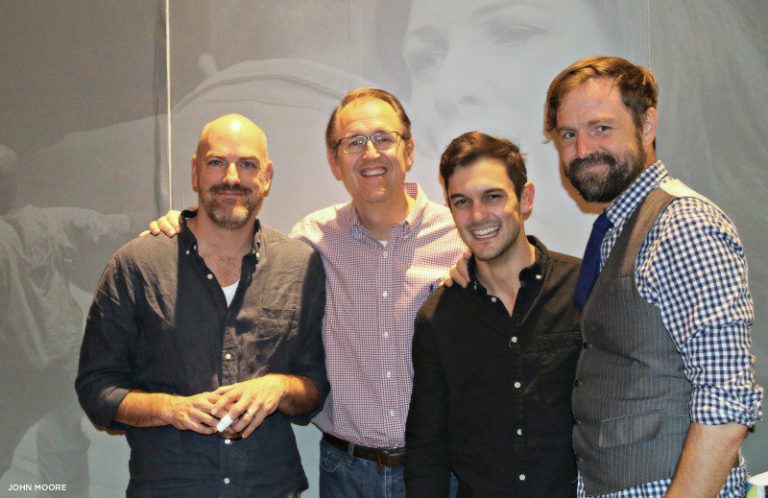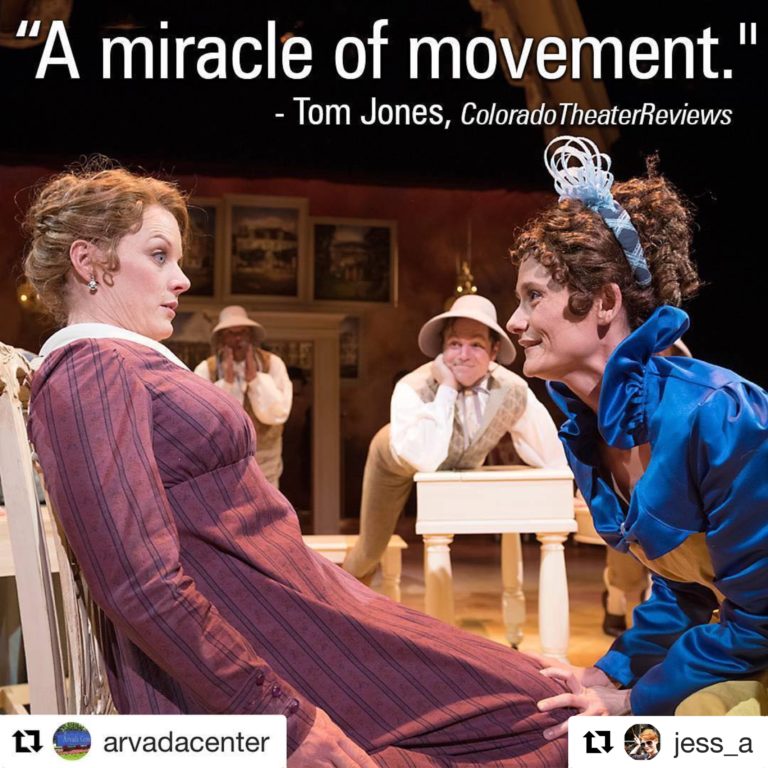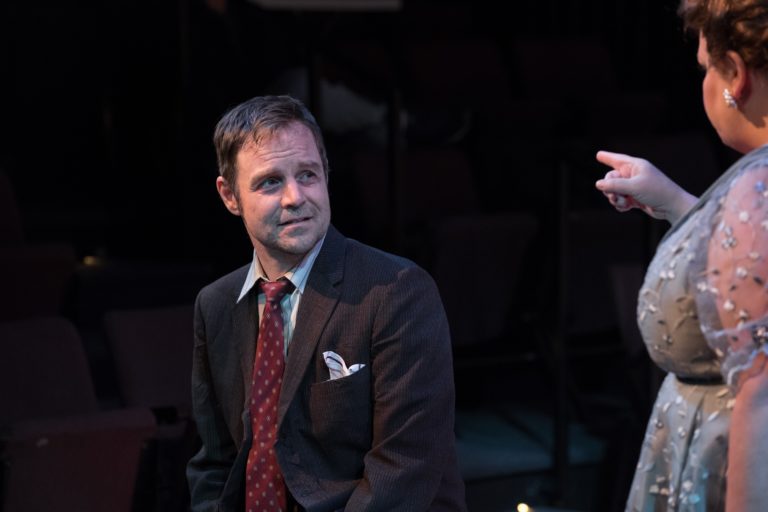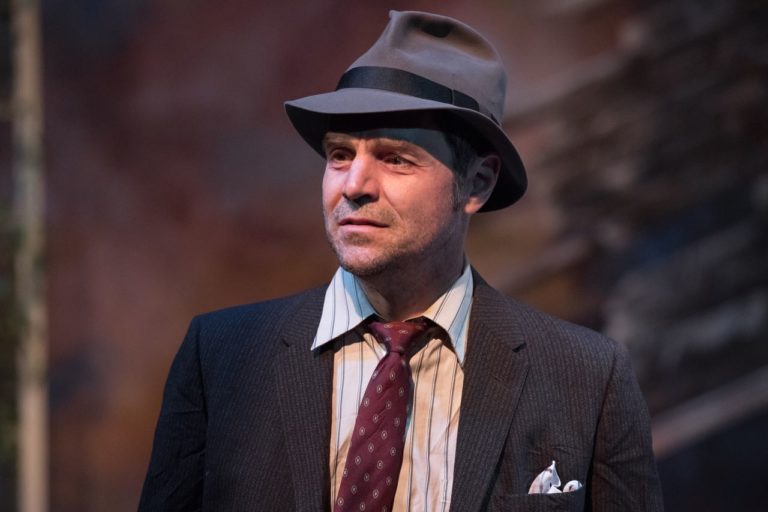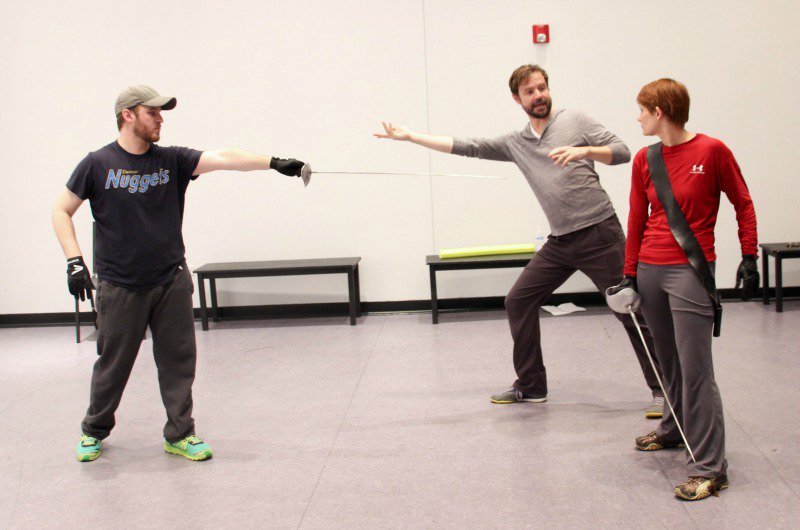
EDITOR’S NOTE: Artists are natural multitaskers. Perhaps that stems from a young age and the struggle to scrape together a reasonable living in the arts. The more you know – and the more you know how to do – the more likely you might be to pay your rent. But even when artists reach the top of their craft(s), they continue to find their services in great demand throughout their careers. Many continue to juggle a variety of creative duties, often on multiple shows at once. That is certainly the case at the Denver Center.
Take Geoffrey Kent, for example. Kent is a Colorado native who started teaching classes with DCPA Education back in 1996 and debuted as an actor with the DCPA Theatre Company in Anthony Powell’s Hamlet in 2002. He won a 2015 True West Award for his performance as Iago for the Colorado Shakespeare Festival. He’s also a certified stage-combat expert. Literally. He’s the former President of the Society of American Fight Directors, the largest organization of stage combatants in the world. In September, he became one of only 18 certified “Fight Masters,” and the youngest by a decade.
With that kind of cred, Kent is also the resident Fight Director for all Theatre Company plays. He is also member of the Arvada Center’s new resident acting company, where he will act in Bus Stop and direct Waiting for Godot. Kent will make his DCPA directorial debut when An Act of God premieres regionally at the Garner Galleria Theatre on Oct. 21. And while he’s been getting that Broadway comedy ready for opening, he’s also been choreographing the complicated stage combat in Frankenstein. And teaching weekly stage-combat classes at the Denver Center.
Twenty years after his arrival at the Denver Center, Geoff Kent is as busy as any kid ever was trying to break into the business. In short, he continues to practice pretty much every theatre discipline he ever learned – at the same time. To illustrate the point, we asked him to take notes we could share with readers that show a day in the life of Geoffrey Kent. He chose Saturday, Oct. 1, just a few days before he completed his work on Frankenstein, and just a few days after starting on An Act of God with Broadway star Wesley Taylor in the role of The Almighty.
Here is his report, in his own words:
6 a.m.: I’m usually up at 6 because that’s when my “Titus Hates Cats” alarm goes off. Here’s how it goes: The cats enter the bedroom to ask for breakfast. Titus, my Chihuahua who thinks he’s a Great Dane, runs subtle interference by emerging from under the covers yammering at me at 100 mph. “OK, I’m awake! God! I mean, Dog!”
6:15 a.m.: Breakfast consists of microwave poached eggs on toast – because I’m lazy. And coffee. Times 3. While over-caffeinating, I shoot off some emails about the Oregon Shakespeare Festival’s Play On! Project to DCPA Literary Manager Douglas Langworthy. The OSF is commissioning modern translations of every Shakespeare play – and Doug is writing three of them. His Henry VI Parts I and II will be read in a workshop in Boulder soon.
6:30 a.m.: I’m wracking my brain trying to find the right kid to play Tiny Tim in A Christmas Carol, which I will be directing next for the Colorado Springs TheatreWorks. I just cannot find that kid. Face palm. My wife, DCPA Teaching Artist Jessica Austgen, is adapting this version. We have a quick connection about the script – over yawns.
7 a.m.: A walk with my proud post-cat-barking attack dogs.
8 a.m. Saturdays are my busiest day of the week because, in addition to my other show duties, I work a three-hour Rapier and Dagger class at the Denver Center into the mix. I bike to work, taking the long route. I only live about 4 miles from the Denver Center, but I am really enjoying this gorgeous ride … until I hit 15 miles, when I realize that 15 miles was a terrible and unnecessary choice to start the day. The soundtrack to Rock of Ages gets me through it. My God in An Act of God – Wesley Taylor – sings on that soundtrack, and I realize I am singing my God’s part. Badly. (PS: I say “my God”) a lot these days.
9:30-12:30: My Rapier and Dagger class at the DCPA’s Newman Education building. That’s across Arapahoe Street from the Denver Performing Arts Complex. I have 16 swashbucklers in this class, with special guest Samantha Egle. (Who among many things is also house-managing for Denver Center shows that will be beginning at 1:30 p.m. today.) She is a mean sword-fighter to boot. On deck for today is fancy footwork and prise de fer – a move where the fencer takes the opponent’s blade into a line and holds it there in preparation for attack. It literally means “taking the blade.”
12:25 p.m.: I enjoy a brief visit from my talented wife, who is teaching an improv class nearby – and she brought coffee! – which is already bringing me to the brink of blissful caffeine overload.
12:30 p.m. sharp: Class ends. I make a quick stairwell run to join my An Act of God rehearsal, which begins at 12:30 in the Orange Studio. Note to self: Remember to eat.
12:31 p.m. I forget to eat. Rehearsal starts.
12:32 p.m.: It’s fun to be working on An Act of God in the Orange Studio. As a longtime fight director I have… well … killed a lot of people in this room. Last week, in rehearsal for Frankenstein, we snapped some necks in this very same spot. Having multiple jobs is weird. (No snapped necks are anticipated for An Act of God.)
(Pictured above right: Erik Sandvold, Wesley Taylor and Steven Cole Hughes get a first look at the scenic model for ‘An Act of God’ at the Galleria Theatre.)
12:32-5:30 p.m.: We work through the first half of the script. We are encouraged to localize the script, meaning to change jokes about New York to jokes about Denver. God is kind of a braggart at the top of the play. The conceit is that God is coming down to Earth to adapt the dusty 10 Commandments for these modern times. But because the very majesty of God might simply be too much for we mere mortals to handle, He takes on the far more approachable human form of a fabulously fun actor with just enough snark and charm. And he’s chosen Wesley Taylor, star of stage and screen (“Smash”). I encourage Wesley to make the bragging even braggier. So we add a bit where Wesley flashes his abs to the audience. This works. When you see them, you’ll know. We have a short discussion about how to best localize a joke about “the gayest area of Denver.” (It’s a surprise.)
It’s delightful to rehearse a comedy with a team of actors who have such amazing timing. Wesley’s castmates are longtime Denver favorites Erik Sandvold and Steven Cole Hughes. Wesley is game for anything. We try 10 punchlines to a single joke. We settle on a favorite, only to abandon it for a better one five minutes later.
At the end of the rehearsal, I get to give God notes. (Isn’t that weird?) A miniaturized version of Noah’s Ark is a set piece. I catch myself actually saying, “God: Can you cradle the ark like it’s a baby?”
5:30 p.m.: We wrap An Act of God rehearsal for the day and make plans to work the second half of the play on Sunday. I then eat food … I think?
6:45 p.m.: It’s fight call for Frankenstein. That means a preview performance is about to take place on the Stage Theatre. About 45 minutes before every show, all of the actors who have any physical contact with another actor during the show meet on the stage for a quick run-through of all violent stage business. This exercise keeps the actors sharp, and safe. It also helps them work these movements into their muscle memory. Frankenstein has lots of short bits of physical action, but this show is further complicated by the fact that two actors trade places each night playing the leading roles of Frankenstein and his Creature. I never remember who is playing the scientist and who is playing the monster on any given night until I show up. My fight captain is Rodney Lizcano, who also is an actor in the show. Because I can’t always be there, a Fight Captain is designated to help the actors with any concerns they may have. One of my fun tasks with Rodney is figuring out how to throw young Charlie Korman about the stage by his head – without actually throwing young Charlie Korman about the stage by the head.
You really can leave nothing to chance when it comes to fight direction, because the safety of the actors is at stake. In my job, the No. 1 priority is and always will be, “Do no harm.”
One major challenge in Frankenstein is staging a moment of conflict between Frankenstein and the Creature that is staged on a massive coffin suspended above the stage by four ropes. Now imagine these two actors wrestling around on this very narrow piece of scenery that is hanging above the stage. Complicated by the fact that the lights go in and out during the scene. Also: The Creature’s eyes are closed. There is very … very little room for error.
We run the scene. No one dies. … Success!
7:30 p.m.: I watch the preview performance of Frankenstein. The young Charlie Korman head-toss toss goes well. I note a few tweaks for Rodney to fix the next day. I will next be working with these actors directly on Tuesday. I watched the show from the grid above the stage with Avi Levin (Charlie’s understudy), and he hangs on every word for the entire show. It’s infectious.
9:30 p.m.: The creative team goes over notes with the cast. Some of the audience has stayed to watch the crew work on the show’s snowfall mechanics. We all say goodbye to amazing Scenic Designer Jason Sherwood, whose work is done, and he leaves town tomorrow. The end of the creative process is often a long series of slow goodbyes, only with no yearbooks to sign. Jason rocks.
9:45 p.m.: Now I forget where I parked my car and wander the parking garage aimlessly. The bike helmet clipped to my bag fails to remind me that I did not actually drive the car to work today. Eventually I remember this … and that I forgot to bring my bike lights. So I wait for my wife to finish her performance in the Arvada Center’s Tartuffe. She kindly comes for me and gives me a ride home.
Midnight: I walk the dogs quickly. They are oddly silent. Surely they are saving their barks for the 6 a.m. wake-up call tomorrow.

